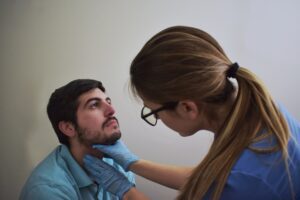

Call Us Today
(828) 505-7033
Email Us
info@advancedoccmed.com
Visit Us
1550 Hendersonville Rd Suite 200 Asheville, NC 28803

(828) 505-7033
info@advancedoccmed.com
1550 Hendersonville Rd Suite 200 Asheville, NC 28803

In today’s globalized world, international travel has become increasingly common, allowing us to explore diverse cultures and destinations. However, as we embark on these exciting journeys, it’s essential to be aware of potential health risks associated with foreign travel. One such risk is typhoid fever, a serious infectious disease caused by the bacterium Salmonella Typhi. In this blog post, we will delve into the significance of the typhoid vaccine for travelers and why it plays a crucial role in safeguarding their health during trips abroad. As an occupational medicine and foreign travel clinic company, Advanced Occmed is committed to promoting safe and healthy travel experiences for all globetrotters.
Typhoid fever is a life-threatening illness caused by the ingestion of contaminated food or water contaminated with the Salmonella Typhi bacterium. Once ingested, the bacteria travel to the intestines and bloodstream, leading to severe symptoms such as high fever, headache, abdominal pain, and a rash known as “rose spots.” In some cases, typhoid can progress to serious complications, including intestinal perforation or organ failure. Typhoid is prevalent in regions with inadequate sanitation and hygiene, especially in parts of Asia, Africa, and Latin America.
Vaccination against typhoid is one of the most effective preventive measures for travelers visiting countries with high incidences of the disease. By receiving the typhoid vaccine, travelers can significantly reduce their risk of contracting the illness and experiencing its debilitating effects. The vaccine stimulates the body’s immune system to produce antibodies that can neutralize the Salmonella Typhi bacterium, preventing infection or reducing its severity.
There are two main types of typhoid vaccines available: the injectable vaccine (Vi capsular polysaccharide vaccine) and the oral vaccine (Ty21a). The injectable vaccine is administered as a single dose, providing protection for two to three years. The oral vaccine, given in a series of capsules, offers protection for up to five years. Both vaccines are highly effective and can be suitable for various travel scenarios.
To ensure adequate protection, it is crucial to receive the typhoid vaccine well in advance of your travel date. The immunity provided by the vaccine may take up to two weeks to develop, so timely vaccination is essential. Planning and scheduling appointments with a travel clinic, like Advanced Occmed, early in the travel preparation process will help ensure you are fully protected before embarking on your journey.
It is normal to have concerns about vaccine safety. However, typhoid vaccines have a well-established safety profile and are generally well-tolerated. Common side effects are usually mild and include soreness at the injection site (for the injectable vaccine) or mild gastrointestinal discomfort (for the oral vaccine). Severe reactions to the typhoid vaccine are rare. If you experience any unusual symptoms after vaccination, consult a healthcare professional promptly.
While vaccination is a critical preventive measure, travelers should also take additional precautions to reduce the risk of contracting typhoid. Practicing safe food and water hygiene, including avoiding street food and consuming only bottled or boiled water, is essential. Regular handwashing and maintaining personal hygiene are also crucial in preventing the spread of the disease.
For comprehensive guidelines and vaccination recommendations for travelers, refer to the Centers for Disease Control and Prevention (CDC) website. The CDC provides valuable information on travel health, including vaccine recommendations based on travel destination and traveler characteristics. Before embarking on your trip, consulting with healthcare professionals at travel clinics like Advanced Occmed will ensure you receive personalized advice and have a well-prepared travel health plan.
When embarking on foreign travel, prioritizing your health is of utmost importance. Protecting yourself from typhoid fever through vaccination is a responsible step to ensure a safe and enjoyable journey. The typhoid vaccine, alongside other preventive measures, can significantly reduce the risk of infection and potential complications. As you plan your next adventure, reach out to Advanced Occmed for expert guidance and personalized travel health services. Safe travels and may your adventures be filled with wonderful experiences and memories!
The typhoid vaccine is recommended for travelers visiting countries with high typhoid incidence rates, especially those in South Asia, Southeast Asia, Africa, and Latin America.
It is advisable to receive the typhoid vaccine at least two weeks before your departure to allow sufficient time for immunity to develop.
Yes, there are two main types: the injectable vaccine (Vi capsular polysaccharide vaccine) and the oral vaccine (Ty21a). Your healthcare provider will recommend the most suitable option based on your travel plans and health status.
The common side effects are generally mild and may include soreness at the injection site (for the injectable vaccine) or mild gastrointestinal discomfort (for the oral vaccine).
Yes, the typhoid vaccine is safe for children above the age of six months. The oral vaccine is particularly suitable for children.
While the vaccine offers protection against some strains of Salmonella Typhi, it may not cover all strains. However, it can still significantly reduce the risk of infection.




